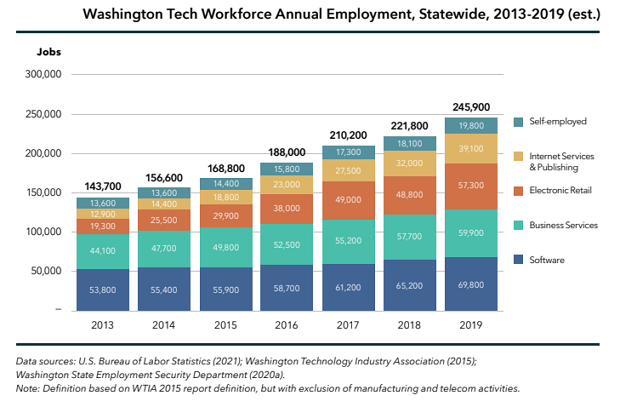9 ways to make the tech sector more equitable: New study examines Washington state workforce

A new report details extensive gender and racial inequities in Washington state’s technology workforce, and makes a series of recommendations to address them.
Among the recommendations: creating state-supported worker-owned co-ops for independent and contract workers; establishing a state startup fund to support women and people of color in the technology industry; and broadening the focus of the state’s technology industry point person and training programs to address equity issues.
The report, Creating Quality Jobs for All in Washington’s Tech Sector, was published by OneAmerica, an immigrant and refugee advocacy organization, and authored by our guests on this week’s episode of the GeekWire Podcast: researcher and consultant Kimberly Earles; and Marcus Courtney, a public affairs consultant who specializes in labor issues.
Here’s a condensed version of the report’s nine recommendations.
- Broaden the Governor’s Information and Communication Technology (ICT) sector lead’s scope to include promoting equity, stability, and quality jobs throughout the industry.
- Create a Washington Innovation startup fund to incubate the next generation of entrepreneurs for technology products and jobs, targeting and supporting women and BIPOC business leaders for funding. This would be similar to funds California, Illinois, Oregon, and Vancouver, B.C.
- Broaden the focus of the state’s Center of Excellence for Information and Computing Technology to include training for additional career pathways, such as project management and technical writing, while expanding support for contract and immigrant workers, and women and BIPOC workers.
- Launch state-supported worker-owned co-ops that independent and contract workers could join to provide services to the technology sector, offering the workers a more stable and equitable employment relationship with the industry employers.
- Convene a BIPOC tech summit, along with regional workforce development councils, to identify structural barriers and solutions led by and centered on people of color.
- Institute an annual state-of-technology and tech workforce report that would produce detailed information on the number of workers in the state, including independent contractors, staffing agency contractors, and H-1B workers, and address the state of diversity within the tech industry.
- Invest in institutions charged with identifying and supporting immigrants and refugees with foreign credentials to apply those credentials to the workforce in Washington state.
- Create state and regional liaison positions to build and strengthen networking opportunities between technology companies and social service organizations working with immigrants and refugees with technology credentials.
- Invest in strategies to connect low-income community members (youth and adults) to skills of value to the technology sector, including programming boot camps, and ensure that such programs include robust strategies for language access and cultural orientation.
Read an executive summary of the report here, and listen to the episode above to hear Earles and Courtney discuss the findings and recommendations.
Audio production and editing by Curt Milton; Theme music by Daniel L.K. Caldwell.
Conclusion: So above is the 9 ways to make the tech sector more equitable: New study examines Washington state workforce article. Hopefully with this article you can help you in life, always follow and read our good articles on the website: Ngoinhanho101.com





